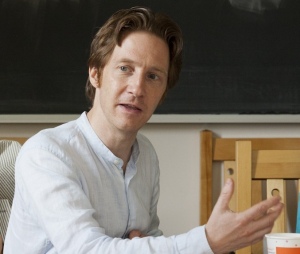News
From the newsletter: Decoding digital humanities, part II
Digital humanities, Thomas Bartscherer CN ’02 notes, is less an entirely new field than “a new set of questions, possibilities, and problems to investigate and work with within traditional fields.”
 Dr. Bartscherer is an assistant professor of humanities and literature at Bard College and co-editor of Switching Codes: Thinking Through Digital Technology in the Humanities and the Arts (University of Chicago Press, 2011). He got into the world of digital humanities thanks, in part, to his Newcombe Fellowship. During his Fellowship year, Dr. Bartscherer was working on a dissertation about Plato and Nietzsche when he was invited to Paris for a Nietzsche project. The project eventually grew into what is now called Nietzsche Source, an online catalogue of scholarly content of the 19th-century German philosopher, cultural critic, poet, composer, and Latin and Greek scholar Friedrich Nietzsche.
Dr. Bartscherer is an assistant professor of humanities and literature at Bard College and co-editor of Switching Codes: Thinking Through Digital Technology in the Humanities and the Arts (University of Chicago Press, 2011). He got into the world of digital humanities thanks, in part, to his Newcombe Fellowship. During his Fellowship year, Dr. Bartscherer was working on a dissertation about Plato and Nietzsche when he was invited to Paris for a Nietzsche project. The project eventually grew into what is now called Nietzsche Source, an online catalogue of scholarly content of the 19th-century German philosopher, cultural critic, poet, composer, and Latin and Greek scholar Friedrich Nietzsche.
During the course of the project, Dr. Bartscherer started to “realize the immense challenges and immense potential of digital technology to transform work in the humanities.”
When considering the specific task of collecting and presenting a large body of work, like that of Nietzsche, the technology makes it relatively easy and inexpensive to display many interrelated resources online. At the same time, as scholars are organizing and posting the work, they have to be able to categorize it and link it in a way that makes sense but can also communicate with other scholars and sources.
“The decisions that are made about how you cut up the world are going to fundamentally affect the way people look at it in the future,” says Dr. Bartscherer. “These sorts of problems come up all over the place. We need people to learn how to switch their codes —you speak my language, I speak your language, and we figure out together how to build these research infrastructures in a way that pulls the best from both worlds.”
Dr. Bartscherer is director of The Language and Thinking Program at Bard College as well as a faculty member in Bard’s Experimental Humanities program, which launched in 2013. The program seeks to create a multidisciplinary space where digital work and the impact of the digital world can be explored, studied, utilized, and placed in a broader context.
This work has led Dr. Bartscherer to conclude that teaching in the digital age requires a new kind of classroom approach. “All of my students have, in their pockets, massively more than I could ever tell them,” he says, “which means there is a whole bunch of stuff I don’t need to tell them. This has made pedagogy primarily about conversations. And that opens up opportunities for what can happen in a classroom that are both daunting and exciting.”
###
This story appeared in the fall issue of Fellowship, the newsletter of the Woodrow Wilson Foundation, in a section titled Decoding Digital Humanities: Perspectives on an emerging and ever-changing field. To see the full newsletter, click here.


